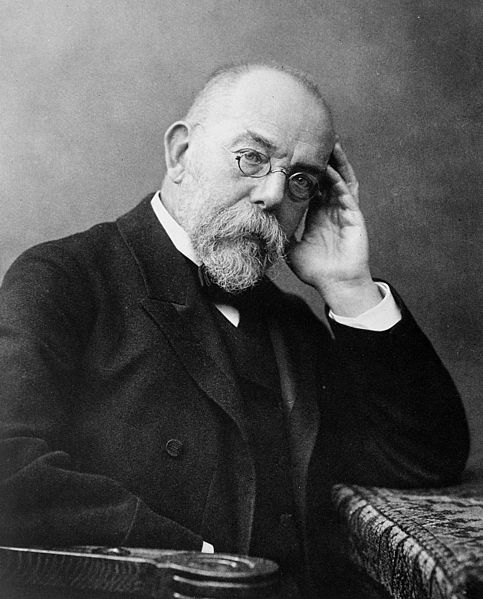The German physician Robert Koch (1843-1910) contributed so much to the field of microbiology and infectious diseases. A contemporary of Louis Pasteur, Koch worked as a physician most of his life.

Wilhelm Fechner
Some of the great contributions to the field of microbiology and infectious diseases include identifying the bacterium that causes anthrax (Bacillus anthracis) in 1877. He recognized both the actively dividing cells and the dormant cells (spores) and developed techniques for studying them outside the body.
Another great contribution, which microbiologists today can be thankful for, is developing a way to grow bacteria in pure culture. After trying different media (potato slices, gelatin, etc) he used a cooking thickener (agar) which created a firm surface so the bacteria could be spread very thinly over the surface.
The micro organism is spread so thinly that individual organisms are separated from each other. Then after time, each individual organism would multiply to form a visible colony from its millions of descendants.
Koch’s discovery of the method of preparing pure culture of bacteria allowed German microbiologists to advance well ahead of microbiologists of France and other nations who were still using broth culture and successive dilutions to get a single organism.
Other work attributed to Koch includes the discoveries of Vibrio cholera in 1883 and the tuberculosis bacterium in 1882 and his studies in tuberculosis later resulted in his winning the Nobel Prize in Physiology or Medicine in 1905.
He is also recognized for his work in Africa with Trypanosoma and tick borne spirochetes.
But what many think his greatest contribution in microbiology and infectious diseases is his formulation of four postulates that associate a particular organism with a specific disease.
Koch’s postulates are as following:
1. The specific causative agent must be found in every case of the disease.
2. The disease organism must be isolated in pure culture.
3. Inoculation of a sample of the culture into a healthy, susceptible animal must produce the same disease.
4. The disease organism must be recovered from the inoculated animal.
Implied in Koch’s postulates are the one organism-one disease concept and it provided the method of establishing the germ theory of disease.
Robert Koch had many other accomplishments in the field of microbiology and infectious diseases and was well respected on the continents of Africa and Asia for his work.
He died on May 27, 1910 from a heart attack.


Greatest Scientist